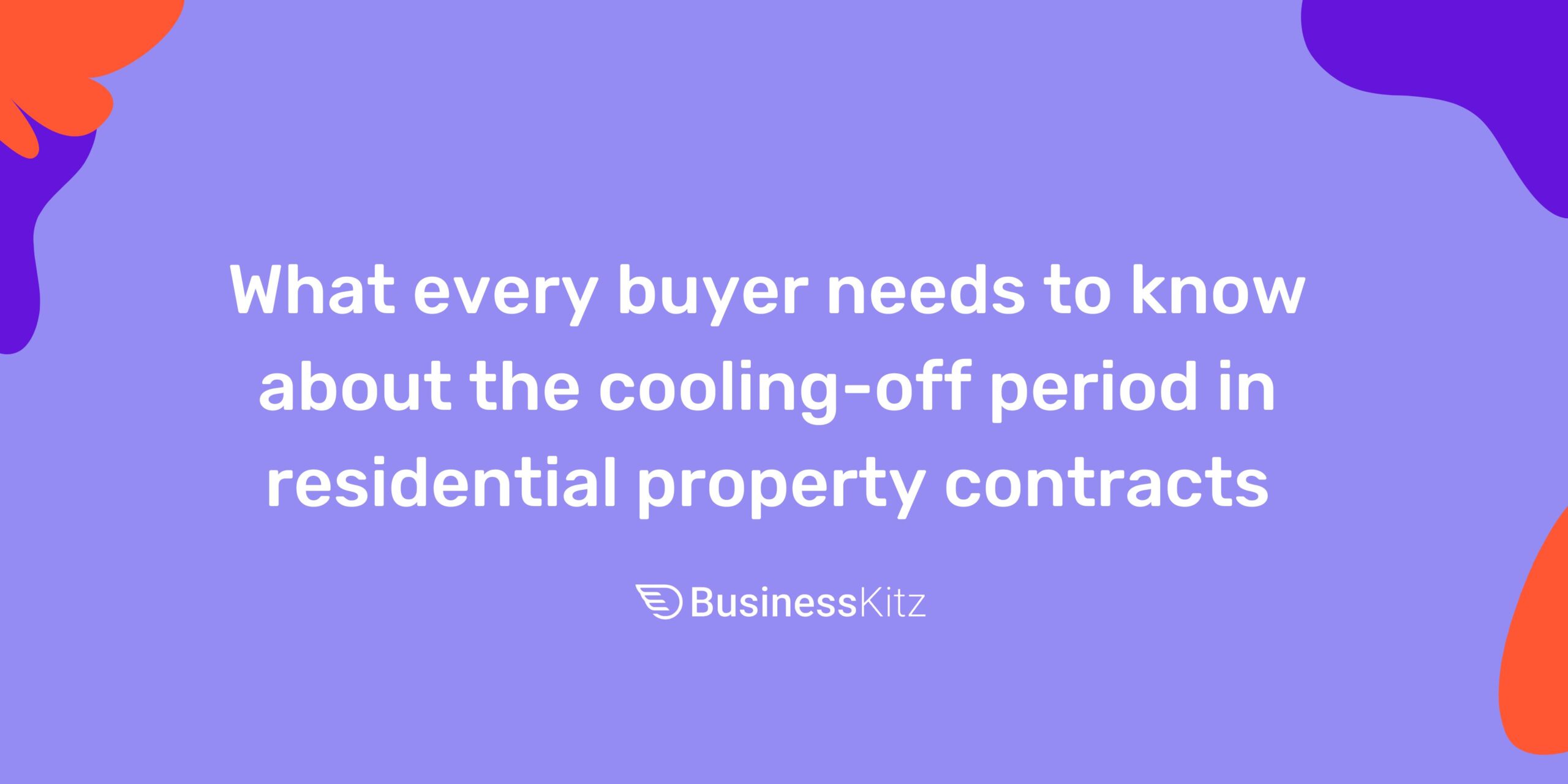
We've helped businesses save $55m with our all-in-one platform. Get instant access to this template and 115+ others, plus AI-powered document creation, starting completely free.
Buying property is a big step. Once you sign the contract, you may still have a short time to change your mind. This time is known as the cooling-off period. It gives you the chance to cancel the sale without major penalties. This guide explains how it works, when it applies and what buyers need to know.
A cooling-off period is a short time frame that allows property buyers to reconsider their decision after signing the contract of sale. During this period, the buyer can cancel the purchase if they change their mind. It's a safeguard to help buyers avoid rushing into a decision, giving them time to review the property and contract terms before fully committing.
A cooling-off period lets the buyer back out of a contract for a residential property after signing. It usually lasts 3 to 5 business days, depending on the state. It gives time to rethink, get advice or cancel the contract. It does not apply to auction sales or some off-the-plan deals.
[ez-toc]
The main purpose of the cooling-off period is to provide protection for buyers. It ensures they have a chance to back out of the deal if they find new information, face a change in circumstances, or simply decide the property isn't right for them.This period is particularly helpful in cases where a buyer may be under pressure during the transaction, such as in competitive markets or private sales. It ensures that buyers do not feel forced to follow through on a decision without having the time to properly think it through.
Cooling-off periods are not the same everywhere. The length of the cooling-off period can differ based on where the property is located.
These differences can affect how buyers approach the property purchase process. It's important to be aware of the cooling-off period in the specific state or territory where you are buying. Understanding the local rules helps ensure you are aware of your rights and can make informed decisions when buying property.The cooling-off period is a valuable tool in residential property transactions. Knowing how it works and how long it lasts in your state can help you navigate the property buying process with confidence.

The cooling-off period offers several important benefits for buyers. It helps protect their interests and ensures fairness in the property transaction.
The cooling-off period gives buyers a chance to cancel the sale if they change their mind. It is an important safety net for those who may feel uncertain after signing the contract of sale. This short window allows buyers to reconsider their decision without rushing into a final commitment.It also helps prevent hasty choices. Sometimes, buyers may act on impulse, especially in competitive markets. The cooling-off period provides them with the time they need to think things through. If the buyer finds new information, or simply feels uncertain, they can back out without major consequences.This period also ensures fairness and transparency in property transactions. Both the buyer and seller are aware of the terms from the start. Buyers know they have a safety net, and sellers understand the process in case the buyer decides to cancel the deal.
The cooling-off period typically applies to private sales. If the property is sold privately, buyers can exercise the cooling-off period and cancel the sale. However, the cooling-off period does not apply to property sales that occur through auctions.In an auction, the contract of sale is binding immediately after the buyer places their bid. There is no opportunity to change your mind or cancel the sale once the auction ends. Buyers must be certain of their decision before bidding.Understanding this difference is important for buyers, as it helps them plan accordingly when deciding to purchase a property via auction or private sale.
Waiving the cooling-off period: Can be waived if mutually agreed by both parties.
The cooling-off period lasts for a set amount of time, which can vary depending on the state or territory. It gives buyers a chance to reconsider their decision before fully committing to the property purchase.
It’s important to know the duration in your state to ensure you make the most of this period.
The cooling-off period begins the day after the contract of sale is signed. This means if you sign the contract today, the clock starts ticking the following day. The buyer then has the full duration to reconsider and decide whether they want to proceed with the sale.If no action is taken before the cooling-off period ends, the buyer is bound to the contract. This means they can no longer cancel the sale unless they have a valid legal reason. Buyers should make sure to take action within the allotted time to avoid being locked into the agreement.Understanding the start and end dates of the cooling-off period is crucial. Missing this window could lead to complications in the property transaction. Always keep track of the deadlines and, if needed, consult with a conveyancer or solicitor to make sure you follow the correct procedures.
You can cancel a property sale during the cooling-off period, but there are clear steps and rules you must follow. This window gives you the right to change your mind after you sign the contract for a residential property, as long as you act within the timeframe.
To cancel the sale contract, you must give written notice to the seller or their agent. You can deliver this notice by email or fax, by hand, or electronically, depending on what the contract allows.You may also have to pay the vendor 0.25% of the purchase price as a cancellation fee. This is standard in most states, including New South Wales and Queensland. For example, if the purchase price is $700,000, the fee would be $1,750.Purchase Price0.25% Cancellation Fee$500,000$1,250$700,000$1,750$1,000,000$2,500
These rules protect your consumer rights and give you a short time to reconsider the deal. If you want to cancel the sale, act quickly, follow the process, and keep proof of delivery in case there’s a dispute.
When a buyer chooses to cancel a property purchase during the cooling-off period, they may be entitled to a refund of the deposit. However, the refund is not always the full amount. In most cases, the buyer must pay a small penalty fee to the vendor.
Most states allow the buyer to cancel the contract during the cooling-off period and get most of their deposit back. A 0.25% fee of the purchase price is usually kept by the seller as a cancellation cost. This amount helps cover the vendor’s time and loss of the deal.Here’s an example of what the refund might look like:Purchase PriceDeposit Paid0.25% FeeRefund Amount$600,000$60,000$1,500$58,500$850,000$85,000$2,125$82,875The deposit usually goes into a trust account, managed by the seller’s agent or conveyancer or solicitor. When the buyer cancels, the agent must return the remaining funds.
To start the refund process, the buyer must:
The refund can take a few days, especially if the notice falls on a weekend or a public holiday. If this happens, the next business day rules apply.To avoid problems, keep a copy of the contract and proof of cancellation. This helps protect your consumer rights if issues arise. If you're unsure, speak with a solicitor or contact Fair Trading or Consumer Affairs for advice.

In most cases, the cooling-off period does not apply to properties sold at auction. Once the hammer falls, the contract becomes binding straight away. There is no chance to back out or cancel the contract unless the seller agrees, which is rare.
When a buyer wins a bid at an auction, they must sign the contract on the spot. This applies to all residential property sales at auction. There is no cooling-off period and no way to change your mind without risk.This rule protects the seller and ensures the sale is final. The buyer must also pay the deposit right after the auction ends. If they pull out later, they may lose their deposit and face further penalties.
Because the cooling-off period doesn’t apply, buyers should be ready before bidding. This means doing all due diligence in advance. Here’s what to check:
Make sure to budget for the purchase price, trust account details and expected deposit. You cannot withdraw after bidding.
To avoid regret after the auction:
Because auction rules are strict, buyers must prepare well. Remember, consumer contracts at auction are final. The cooling-off period may seem short in private sales, but in auctions, there’s none at all.
In some cases, buyers and sellers may agree to shorten or waive the cooling-off period. This can help speed up the process, especially in competitive markets or urgent sales. But it comes with risks for both sides.
You can ask to shorten the period if both the buyer and seller agree in writing. The buyer might request this to secure the residential property faster, or the seller might want more certainty early.Shortening the period:
Once agreed, the cooling-off period starts from the new confirmed date and ends earlier than usual.
Some buyers waive the cooling-off period. This means they give up the right to cancel the sale after signing the contract. They often do this if they’ve:
To waive the period:
Shortening or waiving the cooling-off period carries risk. If the buyer changes their mind or a problem comes up later, there is no legal way to cancel the contract. That’s why it’s key to:
It’s not something to rush. Think it through before giving up this protection.

There are times when the cooling-off period does not apply. Buyers must understand these limits before signing a contract. Without this period, the buyer has no legal way to back out without penalty.
In the following cases, you may not get a cooling-off period:
In some states, if you sign the contract within two business days of inspecting the residential property through the seller’s agent, you may lose the right to a cooling-off period.
Cooling-off periods vary between states and territories. That means your right to withdraw might change based on where the property is.To be safe:
Always get a copy of the contract and review it carefully. Make sure you understand if and when you can cancel the contract or withdraw from the deal.A cooling-off period of 5 business days gives buyers peace of mind—but don’t assume it always applies. Check every time before you buy the property.
The cooling off period is a short time after signing a property contract where the buyer can cancel the sale. This period allows the buyer to reconsider their decision. The cooling off period may vary, but it usually lasts between 3 and 5 business days for residential property contracts. If the buyer decides to cancel, they may lose a small cancellation fee.
Yes, you can cancel the contract during the cooling off period. To do so, you must provide written notice to the seller. There may be a cancellation fee, typically 0.25% of the purchase price. The cooling off period applies to private sales, but it does not apply to auction sales or some other property transactions.
During the cooling off period, the buyer can change their mind and cancel the contract. If they choose to cancel, the deposit will be refunded, but a small fee may be deducted. The cooling off period offers the buyer a chance to reconsider without being locked into the purchase. It's important to read the contract terms to fully understand your rights.
The cooling off period typically lasts 5 business days in New South Wales and Queensland, and 3 business days in Victoria. However, it can vary depending on the state or territory. In some cases, the cooling off period may be extended or shortened if both parties agree. Always confirm the exact period before signing the contract.
If the buyer does not take action to cancel the contract before the cooling off period ends, the contract becomes legally binding. The buyer is then obligated to proceed with the purchase. After the cooling off period, cancelling the contract may result in financial consequences.
Yes, both the buyer and seller can agree to waive or shorten the cooling off period. In cases of urgent sales or where the buyer has already conducted proper due diligence, the cooling off period may be waived. Always seek legal advice to ensure you understand the implications of shortening or waiving the cooling off period.
Cooling off periods mainly apply to private sales of residential property. They do not apply to property purchased at auctions. In addition, cooling off periods for goods or services contracts may vary. Before proceeding, always check the terms of the contract or seek advice from a solicitor to confirm if the cooling off period applies.
Yes, cooling off periods usually apply to off-the-plan property purchases, but rules may differ depending on the state. It’s important to review the contract and consult with a solicitor to ensure that the cooling off period is applicable for off-the-plan property sales. Always be aware of the specific terms before proceeding with the purchase.
The cooling-off period gives buyers a real chance to stop and think after signing a contract of sale. If you change your mind, it can help you cancel the contract with fewer risks. It is a key safeguard for anyone buying a home, especially in a private sale.This period mostly applies to residential property sales, not auction purchases. It gives buyers time to get advice, check the terms of the contract, and feel confident about the deal. But this time frame can vary between states and territories, so always double-check the rules where you are.Before you sign the contract, take time to:
A trusted conveyancer or solicitor can help you spot risks and explain your rights. They can also help if you want to waive the cooling-off period or need to act fast during the settlement period.If you’re unsure, reach out to Fair Trading, Consumer Affairs or your local Queensland Government service. These bodies protect your consumer rights and offer support with property contracts and consumer contracts.The cooling-off period gives buyers a clear option to step back—but the key is acting within time. Make informed choices and never assume your rights. The cost of a mistake could be much more than the 0.25% penalty or missed full refund.
Disclaimer: This content is intended to be used for educational and informational purposes only. Business Kitz does not offer legal advice and cannot guarantee the accuracy, reliability, or suitability of its website content for a particular purpose. We encourage you to seek professional advice from a licensed professional and verify statements before relying on them. We are not responsible for any legal actions or decisions made based on the information provided on our website.
Unless expressly stated otherwise, all content, materials, text, images, videos and other media on this website and its contents are the property of their respective copyright owners.
Copyright © 2025 Business Kitz 14312161